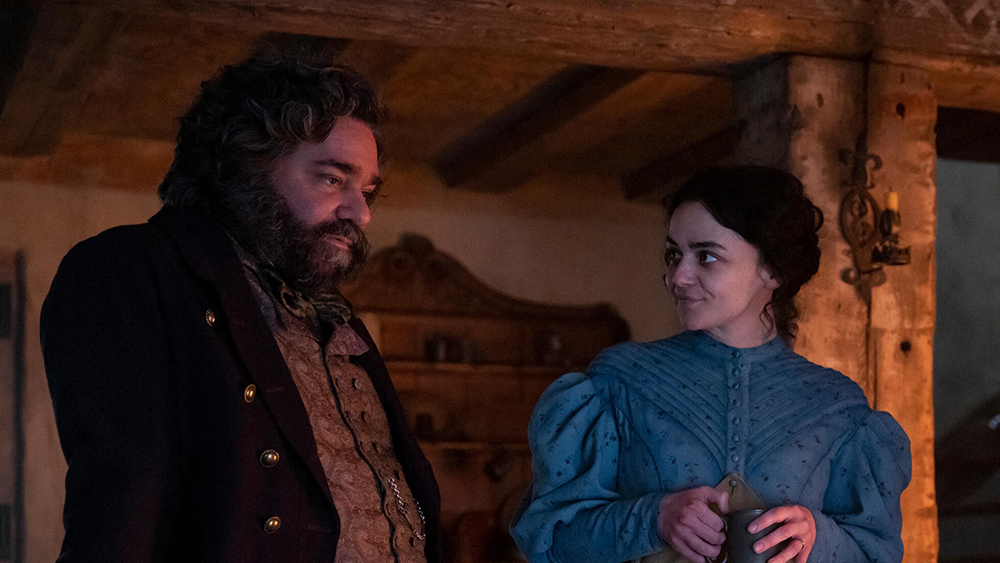S&M Scene in ‘Great Expectations’ Defended by BBC Content Chief
Charlotte Moore, chief content officer at the BBC, has defended the decision of screenwriter Steven Knight, best known for “Peaky Blinders,” to spice up Charles Dickens’ “Great Expectations” in his television adaptation, now airing on the broadcaster.
Referring to an S&M scene in the show, in which a naked Mr. Pumblechook (played by Matt Berry) is seen being whipped by housewife-turned-dominatrix Mrs. Gargery (played by Hayley Squires), Moore said that Knight “believes absolutely everything [in the show] comes from what was alluded to” by Dickens in the novel.
Moore, speaking Thursday to the Broadcasting Press Guild in London, added that “you have to really understanding what [Dickens] would have felt able to write about [in the Victorian era] and read between the lines.”
Another of Knight’s embellishments in the show is that Miss Havisham, played by Olivia Colman, is portrayed as a sadistic opium addict.
In an interview with the BBC last month, Knight said he wanted to view the story through a modern lens. “You couldn’t write about certain things in Dickens’ time: certain elements of sexuality, crime, disobedience against the crown and state. What I tried to do was imagine if Dickens was writing the story now and had the freedom to go to those darker places, what would he do? If he had been liberated to write the things that were going on that he wasn’t allowed to write about.”
Pressed on why the BBC had chosen to update a classic text in this way instead of commissioning new work, Moore said: “Because I think it’s a great way to bring loved texts to new audiences, and to find new interpretations.” She added that it was important to “push the boundaries of storytelling,” and “reinvent [classic novels] for a modern age.”
Asked what creative gaps existed in the scripted arena, Moore said that she and Lindsay Salt, director of BBC Drama, had greenlit a lot of thrillers, but she would like dramas in other genres like romance and comedy, and relationship dramas like Abi Morgan’s “The Split,” which “had a very different tone.”
She added: “We are always looking for different tones and genre that we haven’t [done before]. You’re always looking for things that will surprise you.”
Although she lauded hard-hitting cop drama “Blue Lights,” she also expressed a desire for lighter fare. “I think everyone’s dealing with so much angst and strife at the moment, having something that’s a bit more escapist would be good,” she said.
In terms of BBC-backed films, she praised Raine Allen-Miller’s romantic comedy “Rye Lane” for its “change in tone.”
Moore was asked whether the BBC would continue to produce dramas about controversial subjects, especially those based on real events, such as the one to be written and directed by Peter Kosminsky about the tragic fire at Grenfell Tower in West London. A petition opposed to the drama, stating “tragedy isn’t entertainment,” has gathered almost 58,000 names.
Moore said the broadcaster had a “really strong track record” in this area, and “drama had a real place to tell [true] stories, particularly putting an emotional and historical context on stories that perhaps we read, but don’t really put ourselves in those worlds, and [say] what would we have done?”
She added: “Of course you have to handle stories with real integrity, and a sense of sensitivity and responsibility.”
Moore said she would not veto such projects. “I don’t think it would be right for me to ever censor ideas from very respected writers who have a track record of writing about such subjects, but of course, it will evolve, and I know there’s huge sensitivity.”
Kosminsky’s dramas have included “The Government Inspector,” about the death of Dr. David Kelly, one of the British experts on weapons of mass destruction in Iraq, and “The State,” about four British citizens who join ISIS in Syria.

